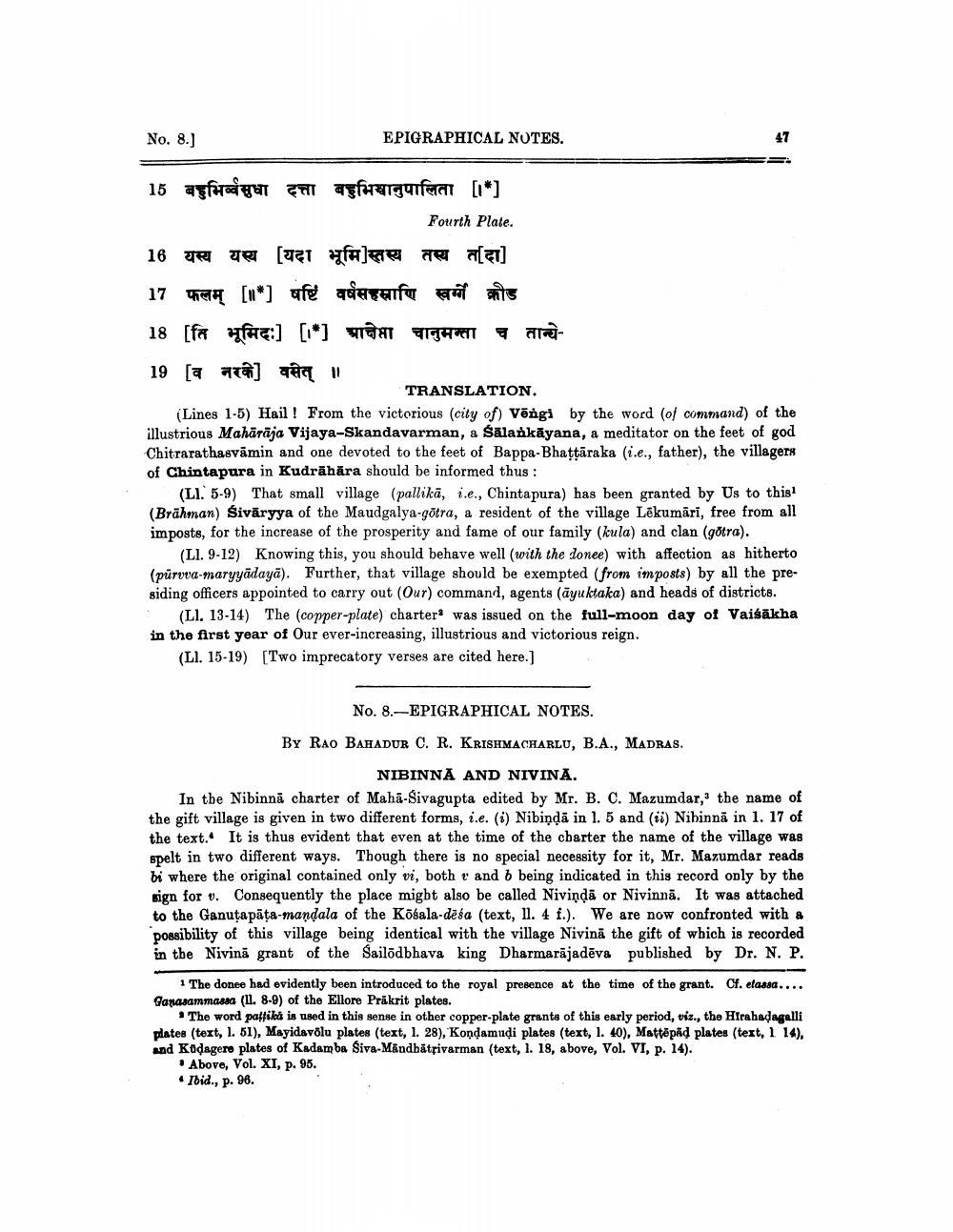________________
No. 8.)
EPIGRAPHICAL NOTES.
15 affitigat al affaranguiferat [1*]
Fourth Plate. 16 tete [zęt A] [ET] 17 F[n*] cafe atashifa raqani its 18 [fx max:] [*] AT CH 7 araw 19 [a ara] #1
TRANSLATION. (Lines 1-5) Hail! From the victorious (city of) Võngi by the word (of command) of the illustrious Mahārāja Vijaya-Skandavarman, a Salankāyana, a meditator on the feet of god Chitrarathasvāmin and one devoted to the feet of Bappa-Bhattāraka (i.e., father), the villagers of Chintapura in Kudrāhāra should be informed thus :
(LI. 5-9) That small village (pallikā, i.e., Chintapura) has been granted by Us to this! (Brāhman) Śiväryya of the Maudgalya-gotra, a resident of the village Lēkumāri, free from all imposts, for the increase of the prosperity and fame of our family (kula) and clan (gotra).
(Ll. 9-12) Knowing this, you should behave well with the donee) with affection as hitherto (puruva-maryyādayā). Further, that village should be exempted from imposts) by all the presiding officers appointed to carry out (Our) command, agents (āyuktaka) and heads of districts.
(Ll. 13-14) The (copper-plate) charter was issued on the full-moon day of Vaisakha in the first year of Our ever-increasing, illustrious and victorious reign.
(LI. 15-19) [Two imprecatory verses are cited here.)
No. 8.-EPIGRAPHICAL NOTES.
BY RAO BAHADUR C. R. KRISHMACHARLU, B.A., MADRAS.
NIBINNA AND NIVINA. In the Nibinnā charter of Mahā-Sivagupta edited by Mr. B. C. Mazumdar, the name of the gift village is given in two different forms, i.e. (1) Nibiņdā in l. 5 and (ii) Nibinnä in 1. 17 of the text. It is thus evident that even at the time of the charter the name of the village was spelt in two different ways. Though there is no special necessity for it, Mr. Mazumdar reads bi where the original contained only vi, both r and 6 being indicated in this record only by the sign for v. Consequently the place might also be called Nivindā or Nivinnā. It was attached to the Ganutapāta-mandala of the Kobala-deśa (text, 11. 4 f.). We are now confronted with a possibility of this village being identical with the village Nivinä the gift of which is recorded in the Nivinā grant of the Sailodbhava king Dharmarājadēva published by Dr. N. P.
1 The donee had evidently been introduced to the royal presence at the time of the grant. Cf. etassa.... Ganasammassa (11. 8-9) of the Ellore Prakrit plates.
• The word partiká is used in this sense in other copper-plate grants of this early period, viz., the Hirahadegalli dates (text, l. 51), Mayidavölu plates (text, 1. 28), Kondamudi plates (text, 1. 40), Mattēpád plates (text, 1 14), und Kodagere plates of Kadamba Siva-Mändbätsivarman (text, 1. 18, above, Vol. VI, p. 14).
. Above, Vol. XI, p. 95.
Toid., p. 96.




